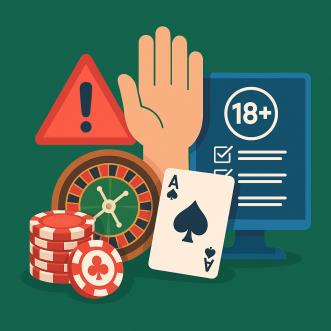Blog

12/09/2025
Responsible Gambling Requirements: How to Stay Compliant and Profitable
Introduction to Responsible Gambling
The gambling industry has grown rapidly worldwide, offering exciting opportunities for operators and entertainment for players. However, with this growth comes the responsibility to protect vulnerable individuals, maintain ethical practices, and ensure compliance with regulatory standards. Responsible gambling requirements are designed to create a safe, transparent, and fair gaming environment—while still allowing operators to remain profitable.
Understanding Responsible Gambling Requirements
What Are Responsible Gambling Laws?
Responsible gambling laws are regulatory frameworks designed to protect players from problem gambling, fraud, and unfair practices. These laws vary across regions but share a common goal: ensuring safe gaming environments where customers can play responsibly.
Global Regulations vs. Local Laws
While some countries, like the UK, have comprehensive gambling commissions, others rely on state or regional authorities. For example, European Union operators often face stricter oversight compared to emerging markets. Understanding both global trends and local nuances is critical for compliance.
The Role of Licensing Authorities
Licensing bodies such as the UK Gambling Commission, Malta Gaming Authority, and US state regulators enforce compliance. Without proper licensing, operators risk fines, bans, or even criminal charges.
Core Principles of Responsible Gambling
Transparency and Fair Play
Operators must disclose clear terms, avoid misleading promotions, and ensure games use certified random number generators (RNGs).
Protection of Vulnerable Players
This involves identifying problem gambling behaviors and intervening with tools like spending limits or self-exclusion.
Promoting Informed Choices
Educational campaigns and responsible gaming reminders help players understand risks and manage playtime responsibly.
Key Compliance Requirements for Operators
Age Verification and KYC Procedures
Operators must implement strict Know Your Customer (KYC) checks to prevent underage gambling and financial crimes.
Self-Exclusion Programs
Customers should have the ability to voluntarily exclude themselves for set periods or permanently if needed.
Deposit Limits and Time-Out Features
Offering players the ability to set personal limits reduces harmful gambling habits.
Advertising and Marketing Restrictions
Aggressive advertising, misleading promotions, or targeting minors can result in severe penalties.
Technology’s Role in Responsible Gambling
AI and Machine Learning in Player Monitoring
Artificial intelligence helps detect risky gambling patterns and intervene before harm escalates.
Data Protection and Privacy
Operators must balance monitoring with strict data protection under frameworks like GDPR.
Financial Implications of Non-Compliance
Legal Penalties and Fines
Non-compliance often leads to heavy fines—sometimes in the millions.
Reputational Damage
Negative press can destroy customer trust, which is difficult to rebuild.
Loss of Market Access
Failure to comply can result in revoked licenses, excluding operators from lucrative markets.
Balancing Compliance and Profitability
Building Trust with Players
Transparency and fairness increase player retention. Customers are more loyal to trusted operators.
Leveraging Responsible Gaming for Brand Loyalty
Promoting responsible gambling can actually boost brand image, making compliance a competitive advantage.
Cost-Effective Compliance Strategies
Automation tools, integrated monitoring software, and strategic staff training reduce long-term costs.
Case Studies: Success Stories in Compliance
European Operators Leading the Way
UK and Malta-based operators showcase how compliance fosters long-term success.
Lessons from the US Market
In the US, states like New Jersey have implemented strict rules that encourage safer gambling while growing revenue.
Best Practices for Implementing Responsible Gambling Policies
Staff Training and Internal Policies
Educating employees ensures compliance is embedded in company culture.
Partnering with Support Organizations
Collaborations with mental health organizations help provide player support.
Continuous Monitoring and Audits
Regular audits and third-party reviews help operators stay ahead of changing regulations.
FAQs on Responsible Gambling Compliance
1. Why are responsible gambling requirements important?
They protect players, ensure fairness, and help operators avoid legal issues.
2. What happens if an operator fails to comply?
Penalties may include fines, revoked licenses, or criminal charges.
3. Do responsible gambling rules differ by country?
Yes, each region has its own requirements, though many share common principles.
4. Can compliance improve profitability?
Yes—operators who comply gain trust, brand loyalty, and access to more markets.
5. What tools support responsible gambling?
Deposit limits, AI-based monitoring, time-out options, and self-exclusion programs.
6. How can operators balance compliance with marketing?
By creating ethical, transparent campaigns that avoid targeting vulnerable players.
Conclusion: The Future of Responsible Gambling Compliance
The future of the gambling industry depends on striking a balance between entertainment and responsibility. Compliance with responsible gambling requirements not only protects players but also safeguards operators’ profitability and reputation. As regulations tighten worldwide, operators who prioritize transparency, fairness, and player protection will remain ahead of the curve.

